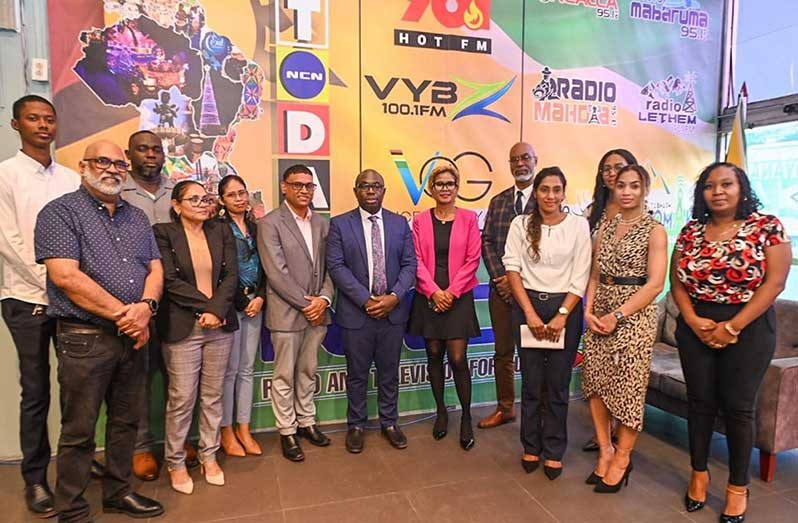–Minister McCoy says, joins veteran broadcasters in reflecting on its evolution
WHEN all else is lost, radio will remain to bring to its listening audience countrywide the news of the day, among other informative broadcasts.
As many celebrated World Radio Day on February 13, veteran Guyanese broadcasters, some of whom have been in the industry for over 60 years, traced the history of radio in Guyana.
Minister within the Office of the Prime Minister with responsibility for Public Affairs Kwame McCoy, during brief remarks at the National Communications Network (NCN)’s World Radio Day celebrations, related that radio allows for people to have the information that is necessary across all walks of life.
He said: “Radio is truly that type of medium that has helped our society, and has helped over many years to transform our society; to bring us to that next point of development, and to be able to help our people become very conscious about what is, what’s not, etcetera. And, it has become very important for us to recognise that in order for radio to be sustainable and for radio to continue, it relies as well on the will of the government.” He went on to explain that this is because we need to have the will to be able to embrace and support radio and radio broadcast as an expansion of radio.
He added that radio does not constrict from the freedom to express ourselves. To be able to sustain this freedom, it requires a government that understands and values democracy, he said.
Today, there are 22 radio stations across the country. Radio was first introduced to Guyana just over 70 years ago, and has produced many great men and women in broadcast over time.
Radio was said to have started at the Philharmonic Hall in Water Street, Georgetown. The first registered station, VP3BG, was renamed VP3MR and later changed to ZFY.
Veteran Broadcaster Ron Robinson, in a recent video broadcasted by NCN said: “When I joined radio, nearly 60 years now, we had what we called the creme de la creme. I learned so much from persons like Vic Insanlly, Pat Cameron, Ray Robinson, Carlton James, Rafi Khan. These were the announcers of the day; the broadcasters, I should say, because they weren’t just announcers. They could do interviews with anybody comfortably, and the standards then were very, very high, because our listeners had to depend on us to get a picture of what we were talking about.”
Robby Reis, another veteran broadcaster recalled that although other Caribbean nations had television at their disposal, Guyana did not.
“So, if you wanted to see a screen, you had to go to the cinema. So, radio was all there was in terms of electronic entertainment and information,” he recalled.
He mentioned that at that time, there were strict and very high broadcasting standards in place. The broadcaster said that after a person’s educational standard was approved, they then had to do an audition, consisting of 20 words in both English and Dutch, along with three news items and two commercials.
What set radio broadcasters apart was their voice, and he remarked that if the voice of the person auditioning was not suited for radio, they were not allowed to be on air.
The introduction of technology creates a stark difference between the radio of yesterday and the radio of today. With no screens or computerised software, the broadcasters utilised a console, which they operated by themselves.
There was a control with two tape machines containing pre-recorded programmes, along with cassette machines which were used to play pre-recorded advertisements and promotions, and then there were turntables.
The broadcasters said there was a lot of research that went into the preparation of a radio programme. Feedback from the listening public was very important.
Guyana, at that time, was the leader in broadcasting in the Caribbean, and produced many legends.
“Radio has been impactful. I am of the view that it continues to be impactful. When you are driving in your car, you don’t look at the TV; you listen to the radio. And you enjoy what the announcer is saying and what music is playing. And I believe radio will always continue to have a huge impact in people’s lives in various ways,” veteran broadcaster Rosemary Benjamin-Noble stated.
They all agreed that the radio of today is different from the radio of long ago, noting that technological advancement is responsible for the change.



.jpg)









